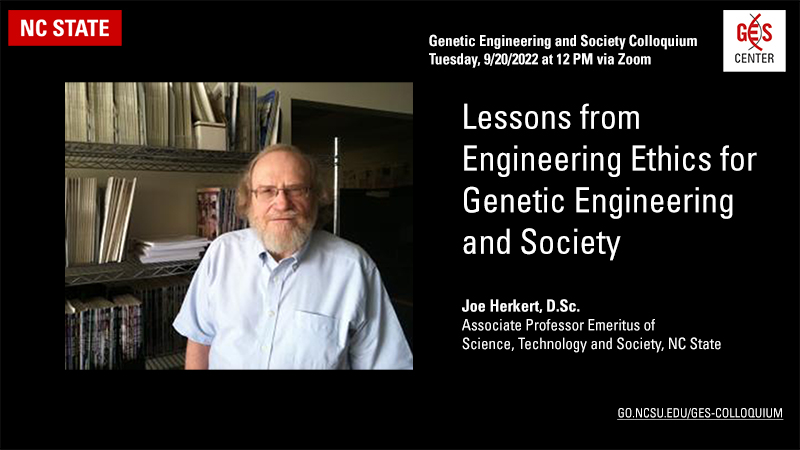
- This event has passed.
Joe Herkert – Lessons from Engineering Ethics for Genetic Engineering and Society | GES Colloquium

Colloquium Home | Zoom Registration | GES Video Library (current) | Video Archives | Podcast | @GESCenterNCSU | Newsletter
Lessons from Engineering Ethics for Genetic Engineering and Society
Joe Herkert, D.Sc., Associate Professor Emeritus of Science, Technology and Society, NC State
ZOOM MEETING: A discussion of key concepts of engineering ethics scholarship and teaching that might be useful in thinking about ethics in the context of genetic engineering and society.
Abstract
There is a long tradition of ethics in engineering practice with the first engineering codes of ethics appearing early in the 20th century, but as an academic sub-field engineering ethics only began to emerge in the 1970s. In most treatments, engineering ethics is grounded in the concept of engineering as a profession. Following a brief introduction of engineering ethics and professionalism, this presentation will focus on some key concepts of engineering ethics scholarship and teaching that might be useful in thinking about ethics in the context of genetic engineering and society. Among these are codes of professional ethics; the use of case studies; microethics and macroethics; engineering as social experimentation; and ethics as design.
Speaker Bio
Joseph “Joe” Herkert, D.Sc., is Associate Professor Emeritus of Science, Technology and Society, North Carolina State University. He has also been a Visiting Scholar at NC State’s Genetic Engineering and Society Center and was a Co-PI on the NSF Grant “Comparing Cultures of Responsible Innovation across Bioengineering Communities.” Herkert has been teaching engineering ethics and science, technology & society courses for more than thirty-five years. He is editor of Social, Ethical and Policy Implications of Engineering: Selected Readings (Wiley/IEEE Press, 2000) and co-editor of The Growing Gap Between Emerging Technologies and Legal-Ethical Oversight: The Pacing Problem (Springer, 2011), and has published numerous articles on engineering ethics and societal implications of technology in engineering, law, social science, and applied ethics journals and books. He has served as Editor-in-Chief of IEEE Technology and Society Magazine and an Associate Editor of Engineering Studies and has been a leader in many professional organizations including the Society on Social Implications of Technology (SSIT) of the Institute of Electrical and Electronics Engineers (IEEE), the National Institute for Engineering Ethics, and the Engineering Ethics and Liberal Education/Engineering and Society (LEES) Divisions of the American Society for Engineering Education (ASEE). He currently chairs the SSIT Technical Committee on Ethics and Human Values and is a member of the ASEE Ethics Committee. Herkert is a Fellow of the American Association for the Advancement of Science, an ASEE Fellow, and a Life Senior Member of IEEE. In 2005 he received the Sterling Olmsted Award, the highest honor bestowed by LEES, for “making significant contributions in the teaching and administering of liberal education in engineering education.” Prior to his academic career, Herkert was a consultant for more than five years in the electric power industry. He received his BS in Electrical Engineering from Southern Methodist University and his doctorate in Engineering & Policy from Washington University in St. Louis.
GES Colloquium is jointly taught by Drs. Jen Baltzegar and Dawn Rodriguez-Ward, who you may contact with any class-specific questions. Colloquium this week will be live-streamed via Zoom. Please subscribe to the GES newsletter and Twitter for updates .
WordPress database error: [Unknown column 'wp_tec_occurrences.start_date' in 'SELECT']SELECT SQL_CALC_FOUND_ROWS wp_posts.*, CAST( wp_tec_occurrences.start_date AS DATETIME ) AS event_date
FROM wp_posts LEFT JOIN wp_term_relationships ON (wp_posts.ID = wp_term_relationships.object_id) LEFT JOIN wp_postmeta ON ( wp_posts.ID = wp_postmeta.post_id AND wp_postmeta.meta_key = '_EventHideFromUpcoming' ) LEFT JOIN wp_postmeta AS mt1 ON ( wp_posts.ID = mt1.post_id )
WHERE 1=1 AND wp_posts.ID NOT IN (17631) AND (
wp_term_relationships.term_taxonomy_id IN (149,521,802)
OR
wp_term_relationships.term_taxonomy_id IN (45,47)
) AND (
wp_postmeta.post_id IS NULL
AND
( mt1.meta_key = '_EventStartDate' AND CAST(mt1.meta_value AS DATETIME) >= '2026-02-20 05:06:12' )
) AND wp_posts.post_type IN ('post', 'page', 'attachment', 'tribe_venue', 'tribe_events', 'tribe_event_series') AND ((wp_posts.post_status = 'publish'))
GROUP BY wp_tec_occurrences.occurrence_id
ORDER BY event_date ASC, wp_posts.post_date ASC
LIMIT 0, 3